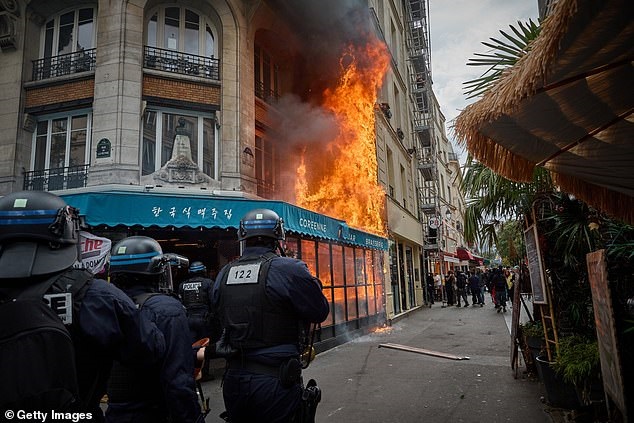French outgoing Prime Minister Sebastien Lecornu, who presented his government's resignation to the French president this morning, delivers a statement at the Hotel Matignon in Paris, France, October 6, 2025.
Photo: Reuters
France is plunged into fresh chaos as another PM QUITS weeks after his appointment in new humiliation for Emmanuel Macron, Reuters stresses.
France's new Prime Minister Sebastian Lecornu has quit just 27 days after being appointed in the position, Reuters reports.
President Emmanuel Macron on Monday accepted Lecornu's resignation, the Elysee Palace said, plunging the European nation further into political deadlock.
French politics has been in turmoil since July 2024, when snap parliamentary elections resulted in a hung parliament.
The sudden resignation came just hours after Lecornu, the former armed forces minister, appointed his new cabinet.
After weeks of consultations with political parties across the board, Lecornu, a close ally of Macron, on Sunday had appointed his ministers, and the cabinet had been set to hold its first meeting on Monday afternoon.
But parties across the board in the National Assembly fiercely criticised the composition of Lecornu's cabinet, which was largely unchanged from Bayrou's, and threatened to vote it down.
Opponents and allies alike, either found it too rightwing or not enough, raising questions on how long it could last, at a time when France is already mired deep in political crisis, with no group holding a majority in a fragmented parliament.
Macron's decision to call a snap parliamentary election last year deepened the crisis by producing an even more fragmented parliament.
What’s Next?
Hours after Lecornu announced his cabinet line-up, in a major deepening of France's political crisis that drove stocks and the euro sharply lower, Reuters writes. The swift, unexpected resignation came after allies and foes alike threatened to topple the new government, with Lecornu saying that meant he could not do his job.
Opposition parties immediately urged President Emmanuel Macron to resign, or call a snap parliamentary election, saying there was no other way out of the crisis.
Lecornu, who was Macron's fifth prime minister in two years, stayed in the job for only 27 days. His government lasted 14 hours, making it the shortest-lived in modern French history at a time when parliament is deeply divided and the euro zone's second-largest economy is struggling to put its finances in order.
French politics has become increasingly unstable since Macron's re-election in 2022 for want of any party or grouping holding a parliamentary majority. Macron's decision to call a snap parliamentary election last year deepened the crisis by producing an even more fragmented parliament.
The centrist president could now call new snap elections, resign or try to appoint yet another prime minister. In past months, Macron, whose mandate runs until May 2027, has repeatedly ruled out the first two options. He is yet to react publicly to Lecornu's resignation.
Opposition Wants Snap Elections
In the opposition, many rushed to ask for Macron to call new snap parliamentary elections or resign.
"Macron must now choose: dissolution or resignation, and fast!" the far-right National Rally (RN) said.
"This joke has gone on long enough, the farce must end," RN leader Marine Le Pen said.
Mathilde Panot, of the hard left France Unbowed, said: "Lecornu resigns. 3 Prime Ministers defeated in less than a year. The countdown has begun. Macron must go."
David Lisnard, of the conservative Republicans, was also among those who called on Macron to leave.
To explain why he could not go forward and strike compromises with rival parties, Lecornu blamed the "egos" of opposition politicians who rigidly stuck to their manifestos, while those inside his minority coalition were focusing on their own presidential ambitions.
"You should always prefer your country to your party," he said in a short speech after his resignation.
New Cabinet Line-Up Angered Opponents
After weeks of consultations with political parties across the board, Lecornu, a close ally of Macron, had appointed his ministers on Sunday and they had been set to hold their first meeting on Monday afternoon.
But the new cabinet line-up had angered opponents and allies alike, who either found it too right-wing or not sufficiently so, raising questions on how long it could last.
Lecornu handed his resignation to Macron, who accepted it.
Lecornu's two predecessors, Francois Bayrou and Michel Barnier, were brought down by parliament over efforts to rein in France's public spending at a time when ratings agencies and investors are watching closely.
France's debt has risen to 113.9% of gross domestic product, while the deficit was nearly double the European Union's 3% limit last year.
"It's just one government after another... this is the major problem for French assets, but it has a spillover effect for the rest of Europe," said Chris Beauchamp, chief market analyst at IG Group.
Deep Instability
France has rarely suffered a political crisis so deep since the creation in 1958 of the Fifth Republic, the current system of government.
The 1958 constitution was designed to ensure stable governance by creating a powerful and highly centralised president endowed with a strong majority in parliament, and to avoid the instability of the periods immediately before and after World War Two.
Instead, Macron - who in his ascent to power in 2017 reshaped the political landscape - has found himself struggling with a fragmented parliament where the centre no longer holds the balance and the far-right and hard-left hold sway.
France is not used to building coalitions and finding consensus.
The chaos was all linked to a 'Let's Block Everything' campaign ultimately aimed at forcing Macron to resign.
 French Riot Police stand back as Wafu Brasserie burns after catching fire during violent clashes near Chatelet in central Paris on September 10, 2025
French Riot Police stand back as Wafu Brasserie burns after catching fire during violent clashes near Chatelet in central Paris on September 10, 2025
As the violence intensified, Bruno Retailleau, the Interior Minister in the outgoing government, said: 'This is not a citizens' movement in any way.
'It's been hijacked by the ultra-Left, and some are determined to carry out violent actions. There is an insurrectional mood.'
'Everyone is sick of Macron, and his government,' said Nicolas, a 19-year-old student involved in a Paris protest at the time.
'The new prime minister will be as useless as the last one.'
There is no centralised leadership to 'Block Everything' – making it similar to the infamous but hugely effective Yellow Vest (Gilets Jaunes) movement.
The protest movement was social media based, and supported by the CGT (Confederation of General Workers), the largest trade union in the country.
France's CAC 40 stock market index fell 2 per cent in early trading, with banks leading losses. The index is up by around 7 per cent for the year but has lagged the double-digit gains enjoyed by European peers.
Chris Beauchamp, chief market analyst at IG, said: 'To lose one prime minister is unfortunate, but four looks like a major crisis. Markets were blindsided by the news this morning that yet another resident of the Hotel Matignon has departed, resulting in yet another new chapter in the torrid drama that is the French government.
read more in our Telegram-channel https://t.me/The_International_Affairs

 11:32 07.10.2025 •
11:32 07.10.2025 •























